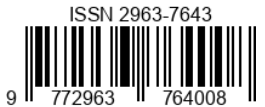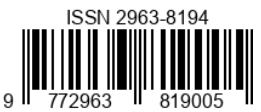Kebijakan Fiskal pada Zaman Utsman Bin Affan dan Ali Bin Abi Thalib
DOI:
https://doi.org/10.55606/jekombis.v3i3.3938Keywords:
Fiscal Policy, Islamic History, State EconomyAbstract
This research aims to analyze the fiscal policies implemented during the leadership of Uthman bin Affan and Ali bin Abi Talib, two caliphs in Islamic history. The specific objectives of this research are: (1) to identify the main fiscal policies implemented by these two caliphs, (2) to analyze the impact of fiscal policies on the country's economy at that time, and (3) to explore the factors that influenced the selection of fiscal policies by the two caliphs. The research method used is a qualitative method with a literature study approach. Data is collected through a literature review of secondary data related to Islamic history, particularly during the leadership of Uthman bin Affan and Ali bin Abi Talib. Secondary data includes scientific journals, reference books, and other relevant sources. Data analysis is carried out using the content analysis method to identify and interpret the fiscal policies implemented by the two caliphs, as well as explore the factors that influenced the selection of these policies. The research findings are expected to provide a deeper understanding of fiscal policies in the early Islamic period and their implications for the country's economy at that time.
Downloads
References
Akbar, A., Misbah, A., & Arisandi, Y. (2022). Sistem Ekonomi dan Fiskal Pada Masa Khulafaurrasyidin. DIES: Journal Of Dalwa Islamic Economic Studies, 1(1), 29–42. https://doi.org/10.38073/dies.v1i1.598
Amalia, E. (2010). Sejarah Pemikiran Ekonomi Islam : Dari Masa Klasik Hingga Kontemporer. Gramata Publishing.
Aziz, A., Fadillah, F., Abdillah, M. Z., Nurul, P., & Lubis, Z. (2024). Perekonomian Pada Masa Al- Khulafa ’ Al-Rasyidin. Perspektif: Jurnal Pendidikan Dan Ilmu Bahasa, 2(1), 134–144.
Chapra, M. U. (1985). Umer Chapra.pdf (p. 220). The Islamicn Foundation.
Dwiyanti, S., Wahyudi, A., Wahyu, A., Setianto, E., Studi, P., & Ekonomi, M. (2023). Kebijakan Fiskal dalam Perspektif Islam. Ekonomikawan: Jurnal Ilmu Ekonomi Dan Studi Pembangunan, 23(1), 109–118. https://doi.org/10.30596/ekonomikawan.v23i1.10955
Fahrani, I., Suryana, D. F., Ismail, A. S., & Marlina, L. (2023). Analisis Pemikiran Ekonomi Masa Utsman bin Affan dan Relevansinya di Zaman Sekarang. Al-Istimrar: Jurnal Ekonomi Syariah, 2(1), 59–68. https://doi.org/10.59342/istimrar.v2i1.247
Fatma Azzahra, Salmi Wati, & Andy Riski Pratama. (2023). Perkembangan Perdagangan Islam di Nusantara pada Masa Lampau dan Kontemporer. Jurnal Riset Rumpun Agama Dan Filsafat, 3(1), 01-14. https://doi.org/10.55606/jurrafi.v3i1.2179
Hasanah, R. A., Husna, R., Anjasya, G., Tanjung, F. A., Nasution, M., Jl, A., Iskandar, W., Estate, M., Muhammad, N., Khattab, U., Affan, U., Rasyidin, K., & Saw, M. (2024). Perekonomian Pada Masa Al- Khulafa ’ Al-Rasyidin Universitas Islam Negeri Sumatera Utara Nabi Muhammad SAW membawa agama Islam dan ekonomi Islam berkembang Masa Abu Bakar Ash-Shiddiq. 1.
Hasibuan, S. W., & Dkk. (2021). Sejarah Pemikiran Ekonomi Islam (A. Triyawan, Ed.). Median Sains Indonesia.
Heru, M., Atikah, R., & Nurlaila. (2022). Kebijakan Fiskal Ekonomi Islam. 6(2), 7–16.
Hilman, J. (2022). Eksistensi dan perkembangan baitul maal pada masa pemikiran ekonomi islam khulafaur rasyidin. Osfpreprints, 1(1), 9.
Khoirulina, C. (2020). Pengelolaan Keuangan Publik Islam Pada Masa Khalifah Umar bin Abdul Aziz. Jurnal Ekonomi Bisnis & Sosial, 4(1), 48–60.
Kusniawati. (2011). Zakat Sebagai Kebijakan Fiskal dalam Ekonomi Islam. In UIN Alauddin Makassar.
Maisyaroh. (2020). Kepemimpinan ‘Utsmanbin ‘Affan dan ‘Alibin Abi Thalib. Ihya Al Arabiyah: Jurnal Pendidikan Bahasa Dan Sastra Arab, 1, 178–180.
Mujiatun, S. (2014). Kebijakan Moneter Dan Fiskal Dalam Islam. Jurnal Ekonomikawan, 14(1), 73–81.
Munthe, M., Erman, N., & Oktavianti, R. (2021). Kebijakan Fiskal Ekonomi Islam. 1(2), 156–170.
Nur Fajriah, R., & Risqy Kurniawan, R. (2022). Perkembangan Kebijakan Ekonomi Islam Masa Khulafah Rasyidin. Jurnal Al-Ibar, 1, 15.
Oktaviana, M., & Harahap, S. B. (2020). Kebijakan Fiskal Zaman Rasulullah Dan Khulafarasyidin. Nazharat: Jurnal Kebudayaan, 26(01), 283–307. https://doi.org/10.30631/nazharat.v26i01.29
Rahmadi, T. (IAIN P. R. (2021). Sejarah Pemikiran Ekonomi Islam (Periode Khalifah ’Utsman Bin Affan dan Periode Ali Bin Abi Thalib). Pincis (Palangka Raya International and National Conference on Islamic Studies), 1(1), 63–76.
Saputra, M., & Mirawati, M. (2023). Penerapan Kebijakan Fiskal Khalifah Ali Bin Abi Thalib Dalam Pendistribusian Pendapatan Negara Di Indonesia. AL-ITTIFAQ Jurnal Ekonomi Syariah, 3(2), 1. https://doi.org/10.31958/al-ittifaq.v3i2.10304
Zakki, S., Mubarok, S., & Santoso, S. (2022). Kebijakan Fiskal Pada Masa Utsman Bin Affan. 1(3), 240–244.
Downloads
Published
How to Cite
Issue
Section
License
Copyright (c) 2024 Jurnal Penelitian Ekonomi Manajemen dan Bisnis

This work is licensed under a Creative Commons Attribution-ShareAlike 4.0 International License.







